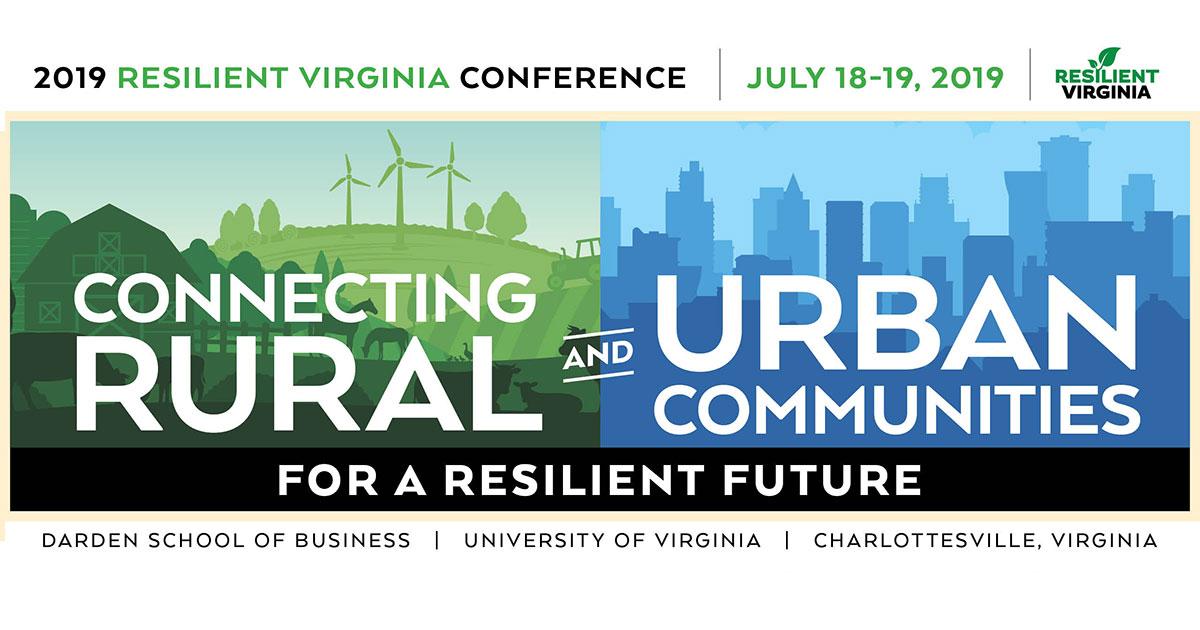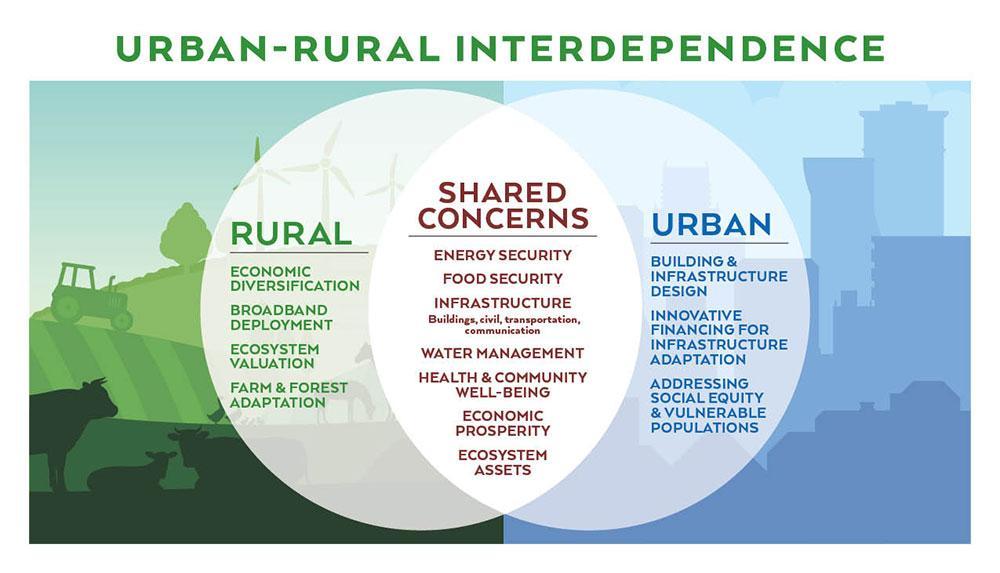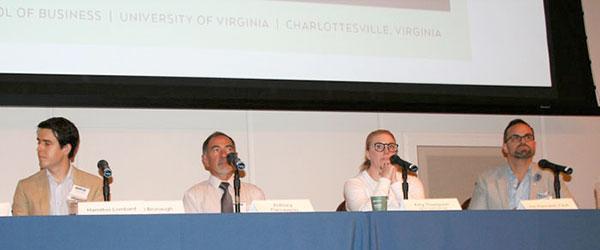- Next Big Event — The Virginia Clean Energy Summit
- Resilient Virginia Conference — Sessions Reflect Rural/Urban Theme
- Land and Natural Resource Use Loom Large for Climate Impact
- Local Education on Electric Vehicles
- Volunteer Thank You — Position Open
- Resilient Events Calendar
- Membership: Special Offer for Limited Time!
What’s New

Virginia Clean Energy Summit
Tuesday, September 17th | Richmond Convention Center | Richmond, Virginia
You’re invited to attend the first Virginia Clean Energy Summit. The conference goal is to highlight opportunities and encourage collaboration that accelerate the use of more energy efficiency, solar, wind, storage, EVs, and other clean energy solutions in the state. Conference attendees will include representatives from businesses, state and local governments, academia, and NGOs.
Who You Will Hear
- Morning Keynote: Governor Ralph Northam
- Lunch Keynote: Claire Broido Johnson, SunEdison Co-Founder
- Breakout Session Speakers from Solar, Wind, and Energy Efficiency Businesses, State and Local Governments, Universities, and Associations
Topics Will Include
- Transforming the energy grid;
- Local government, residential, and business market segment solutions;
- Finance options, including C-PACE and private investment;
- Local energy security with microgrids and innovative technology;
- Utility energy efficiency programs;
- Electricity rate design;
- Transportation and mobility; and
- Solar, wind, batteries, electric vehicles, and smart building technology.
Conference organizers have secured speakers from across the state and the nation to discuss Virginia’s clean energy development — see the lineup here and register to attend.
Register NowCo-hosted by MDV-SEIA, Resilient Virginia, Virginia AEE, VAEEC, and VA-REA, with supporting roles from JMU’s Office for the Advancement of Sustainable Energy, the VA DMME, and Viridiant.
![]()
Resilient Virginia Conference — Sessions Reflect Rural/Urban Theme

The 2019 Resilient Virginia Conference, held at the UVA Darden School of Business, brought together over 300 motivated participants from state and local governments, from universities and community organizations, and from the business sector. Speakers and attendees shared their progress in planning and implementing resiliency activities around the state and at the regional and national levels.
Our theme this year — Connecting Rural and Urban Communities for a Resilient Future — was reflected throughout the conference.
Annette Osso, Managing Director of Resilient Virginia, provided introductory remarks on the rural-urban interdependency dynamic that was summarized in this graphic.

The theme also set the stage for an innovative exchange of ideas in the early afternoon Plenary Session with Anthony Flaccavento, SCALE; Perkins + Will representatives, Amy Thompson and Jon Penndorf; and Hamilton Lombard from UVA’s Cooper Weldon Center, led by Jonah Fogel, from the UVA Environmental Resilience Institute.

One of the points made by the Plenary speakers was the fact that while urban and rural areas may not be seen as “equal,” they both have vital, if sometimes not fully recognized interdependencies. These include contributions to the economy, access to local foods, improving health, and protection of natural resources.
Anthony Flaccavento commented on the “mutuality” factor, for example, that rural communities can benefit from the experience of cities and urban areas in adopting smart growth planning policies. The Perkins + Will speakers mentioned the importance of areas surrounding urban centers to help address increasing stormwater and flooding occurances.
Speakers also commented on the “food desert” problems in both rural and urban areas, with the need and opportunity for a win-win dynamic of supporting the livelihoods of local farmers while bringing fresher, more nutritious foods to neighborhoods.
View Anthony Flaccavento’s and the Perkins+Will presentations on the conference webpage.
In addition, the Conference Breakout Sessions carried forth the Rural/Urban theme by bringing together examples of resiliency initiatives from across the state and region. These ranged from the resiliency role of ecosystems and agriculture to the progress being made in Hampton Roads and Northern Virginia on climate adaptation plans for infrastructure.
We have heard much positive feedback about the event, including these comments:
“Great turnout and a lot of fun with smart people ready to take action!”
—Hilari Varnadore, Director, LEED for Cities and Communities, USGBC
“Inspiring to see so many people focused on the same resiliency challenges.”
“Great turnout, great speakers, great conference!”
— Chris McDonald, Director of Government Relations, Virginia Association of Counties
Look for not only the session PowerPoint presentations, but also the Plenary Session videos to be posted on our website in the near future.
Land and Natural Resource Use Loom Large for Climate Impact: Two Articles Present Global and Regional Perspectives
By Tracy Garland, Social Media Director, Resilient Virginia

Study Highlights Land Use as Climate Concern and Part of Solution
A new report released by the Intergovernmental Panel on Climate Change (IPCC) highlights the importance of land as both a potential source of greenhouse gas emissions and as a climate change solution. IPCC’s Special Report on Climate Change and Land (SRCCL) concluded that keeping global warming well below 2°C can be achieved only by reducing greenhouse gas emissions in all sectors, including land use and agriculture.
The IPCC reported that about 23% of human-caused greenhouse gas emissions come from changes to landscapes for agriculture, forestry, and other uses. On the other hand, land sequesters almost a third of all human-caused carbon dioxide emissions. However, in order to scale back rising temperatures, we need to change the way we produce food and manage land.
The report highlights several areas of concern:
- Current land use management techniques are exacerbating climate change.
- Land is a critical carbon sink, removing more emissions than they generate.
- Land is being negatively impacted by climate change.
- Several promising “land-centric” proposals exist to reduce emissions and/or remove carbon while providing other significant benefits.
- All proposed solutions require careful study of risks and trade-offs.
Of particular concern when considering proposed land-based climate solutions are their potential impacts on other land needs, such as food and water security. In addition, if climate change solutions are not more actively pursued in the energy and transport sectors, land-based solutions will become even more necessary.
The primary conclusion of the report is that, when done correctly, land-based solutions can reduce emissions while providing other environmental and social benefits. However, when done poorly, land-based solutions can exacerbate food security and environmental problems. Careful risk and trade-off analysis are necessary to successfully perform this delicate balancing act.
7 Things to Know About the IPCC’s Special Report on Climate Change and Land. August 8, 2019, Kelly Levin and Sarah Parsons, World Resources Institute.
Model Shows Effects of Climate Change in Appalachian Regions
 The Appalachian Mountains are known for their high peaks and deep valleys, but what is often underappreciated is the role that they play in supplying water to the Appalachian region and beyond. A new study highlights how climate change could play a role in the ability of the mountains to continue to provide water security both within and beyond the region’s borders.
The Appalachian Mountains are known for their high peaks and deep valleys, but what is often underappreciated is the role that they play in supplying water to the Appalachian region and beyond. A new study highlights how climate change could play a role in the ability of the mountains to continue to provide water security both within and beyond the region’s borders.
Important population centers in the eastern and midwestern United States rely on the Appalachian mountain region for water supply. The high Appalachian mountain ridges are able to hold moisture from the atmosphere, essentially acting as a reservoir, before sending that water down rivers and streams and through aquifers to supply water to millions of people. Therefore, changes to the climate of the Appalachian region can have far-reaching impacts on water supply in a large area of the southeastern U.S.
Researchers at West Virginia University’s Mountain Hydrology Laboratory recently released their findings on the potential impact of climate change on water security in the seven-state Appalachian region. They found that the Appalachian region will be getting hotter, drier, and yet wetter by 2050 if nothing is done to curb climate change.
Hotter: as the global temperature rises, Appalachia could become five to ten degrees hotter by 2050.
Drier: As the atmosphere warms, water that is held in vegetation, soils, and water bodies evaporates, causing dryer conditions. Crops and the animals and humans that rely upon those crops will be negatively impacted.
Wetter: The rapid evaporation from the vegetation, soils and waterbodies then saturates the atmosphere, causing pouring rains. With the heavy rain comes landslides and floods.
Thus, climate change disrupts the ancient process of water being stored and released, creating times when there will be too much, then too little water. Therefore, everyone including governments, businesses, hospitals, and education institutions will all need plan for, and adapt to, these feast or famine scenarios.
The researchers also found that if we were able to stabilize climate change now, then by 2050, the climate system could return to normal conditions. However, if we continue high emissions “business as usual,” then precipitation in the region will continue to increase throughout the 21st century. The study also points out the importance of establishing policies to combat climate change at all levels, from local to global.
Sources:
Appalachia to become Hotter Wetter AND Drier in Climate Model with Severe Economic Impacts. August 11, 2019, Robbie Harris, WVTF.
Full report: Seasonal Changes in Water and Energy Balances over the Appalachian Region and Beyond throughout the Twenty-First Century. Authors, Rodrigo Fernandez and Nicolas Zegre. West Virginia University. Published May 9, 2019, American Meteorological Society Journal Online.
Local Education on Electric Vehicles
 A new statewide campaign with the goal of building interest and adoption of electric vehicles is starting this Fall. Electrify Your Ride VA will hold local events around the state (see the Resilient Calendar listings) that will feature local EV owners and their cars, encourage hands-on learning with fellow community members, and point people toward more information such as an easy-to-use website that includes dealers who have agreed to provide EVs at discounted rates.
A new statewide campaign with the goal of building interest and adoption of electric vehicles is starting this Fall. Electrify Your Ride VA will hold local events around the state (see the Resilient Calendar listings) that will feature local EV owners and their cars, encourage hands-on learning with fellow community members, and point people toward more information such as an easy-to-use website that includes dealers who have agreed to provide EVs at discounted rates.
The project is a collaboration between nonprofits, Generation 180, Virginia Clean Cities, and the Green Energy Consumer Alliance. Since over 45% of energy-related carbon dioxide emissions in Virginia come from the transportation sector, this campaign will work to benefit the health of individuals and the environment by encouraging EV purchases. Find out more at generation180.org/electrify-your-ride.
If you would like additional information about the role of transportation in mitigating carbon emissions, the role the Commonwealth of Virginia is taking in regional transportation initiatives, and the electrification of the automobile industry, explore the presentations by Alleyn Harned, Chris Bast, and Rebecca Duff from the 2019 Resilient Virginia Conference. See the link below.
Transportation’s Role in Mitigation — Breakout Session
2019 Resilient Virginia Conference, July 17, 2019
SPEAKERS
Alleyn Harned, Executive Director, Virginia Clean Cities
Decarbonizing Transportation, the Big Picture
Chris Bast, Chief Deputy, Virginia Department of Environmental Quality
The VW Settlement and Regional Electrification
Rebecca Duff, Senior Research Associate, Battan Institute for Entrepreneurship and Innovation, UVA
Path to 2060: Electrification of the Auto Industry
Volunteer Thank You!
 Resilient Virginia would like to send out a well-earned “Thank You” to Barbara Swart — community activist and concerned environmentalist — who has been our “Calendar Event Volunteer” for the last four years!
Resilient Virginia would like to send out a well-earned “Thank You” to Barbara Swart — community activist and concerned environmentalist — who has been our “Calendar Event Volunteer” for the last four years!
AND… We would like to announce that a volunteer position is open. Please contact Annette Osso (osso@resilientvirginia.org) if you would like to become the next “Calendar Event Volunteer.”
![]()
Resilience Events Calendar
Here are some highlights of events happening this Fall.
September 14, 2019: EV Round-Up. Hosted by Electrify Your Ride VA, 9AM–1PM, Dorey Park Farmers Market, Richmond, VA.
September 15, 2019: EV Round-Up. Hosted by Electrify Your Ride VA, 10AM–2PM, Sprint Pavilion, Charlottesville, VA.
September 17, 2019: Virginia Clean Energy Summit. Hosted by VA-Renewable Energy Alliance with Resilient Virginia and others as partners. See our special discount offer to Members (below) and register today at vacleanenergysummit.org.
September 21, 2019: EV Round-Up. Hosted by Electrify Your Ride VA, Time and Location TBD. Roanoke, VA.
September 22, 2019: EV Round-Up. Hosted by Electrify Your Ride VA, Time and Location TBD, Fairfax, VA.
Check our Resilient Events Calendar on a regular basis to find out what is happening in Virginia, around the nation, and virtually through webinars.
Membership
Special Offer — Limited Time! Now through September 10.
We are offering you a Member-Only discount to attend the

We’ll send you the Member Discount Code.
Register for the Clean Energy Summit using the Discount Code and save $50 on your registration.
Resilient Virginia is on a mission to
*Inform *Educate and *Activate
Virginia communities to build resiliency in the face of challenges to community prosperity, national security, and changing climate.
You can help by:
Becoming a Member
Signing on as an Annual Sponsor
Continue your support throughout the year by using one or both of these online shopping sites that contribute to Resilient Virginia:
 If Amazon is your online shopping choice, go to Smile.Amazon.com and designate Resilient Virginia and we will receive a donation with every purchase.
If Amazon is your online shopping choice, go to Smile.Amazon.com and designate Resilient Virginia and we will receive a donation with every purchase.
 Find lots of discounts and many participating stores for office supplies, general shopping, and special event gifts.
Find lots of discounts and many participating stores for office supplies, general shopping, and special event gifts.




